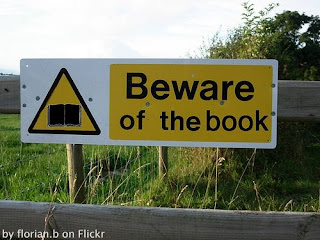Today we have Ceilidh from the YA blog, The Book Lantern. She caught my eye with a post she did on incendiary language, censorship and author responsibility. As soon as I read it, I knew I wanted her to write a post for Banned Books Week. I asked and she graciously agreed.
A little info about Ceilidh. She's 20 and in her third year of Celtic/English lit studies at university in Edinburgh. She's a native Scot, obnoxious accent and all. :D She's been obsessed with reading for pretty much all her life and the Harry Potter books spurned her on to start writing her own stories. She'll read almost anything and has a love of YA as well as Shakespeare, gothic lit and LGBT theater. She's been reviewing YA since July 2010 when she started the Sparkle Project (another blog) and she's 22000 words into her YA novel. She also loves movies, politics and debating. She really, REALLY loves debating!
~ ~ ~ ~ ~ ~ ~ ~ ~ ~ ~ ~ ~ ~ ~ ~ ~ ~ ~ ~ ~ ~ ~ ~ ~ ~ ~ ~ ~ ~ ~ ~ ~ ~ ~ ~ ~ ~ ~ ~ ~ ~ ~ ~ ~ ~ ~ ~ ~
It seems like such a cliché to use the oft quoted line from Spider Man but I struggle to think of a time when it isn’t relevant. It’s a piece of advice that could, and should, be applied to almost any situation and the subject of books is certainly not left out. With Banned Book Week in full force, it’s important to remember just why the literature we consume so feverishly is considered dangerous by some.
I would argue that the written word is the most powerful weapon we have. It can literally change the world. It’s built up and brought down governments, it makes the world’s population smarter and more aware, it opens up a realm of infinite possibilities, and that’s terrifying to some. Ignorance is a pretty powerful weapon too. Keep the information away from the masses and they’re easier to control. Whether a book is burned or taken off the shelves, the impact remains the same. Nowadays, it seems as though the book banners of the world (or more specifically, the United States. As a Brit, I have never witnessed book banning in my own neck of the woods before and it is a pretty rare occurrence) have decided ignorance is bliss for its youth. According to the American Library Association, of the top 10 most banned or challenged books of 2010, 8 are children or young adult novels. Many deal with the simplest of issues such as growing up, others tackle more hard hitting issues like drugs and abuse, and the issue of homosexuality is pretty much a no-go area. Essentially, anything that moves away from the default mode of straight white god-fearing people who don’t have sex until they’re married is cause for concern. Forgive my snide time but it’s hard for me to sympathise with groups of people who declare LGBTQ content to be dangerous. If your way of life is threatened because of a children’s picture book about two male penguins who adopt a child together then you have bigger things to worry about!
Let me emphasise this point before I continue: censorship is wrong. It’s a lazy way to avoid tough topics and it serves to make us all a little stupider. The cutting off of information to those who want and need it the most does nothing but harm us all. The world should treat books and the written word with the respect it deserves. However, the power that authors have to change the world must also be used in a sufficiently responsible manner.
To me, the answer is and always will be education. Change the status quo. Complain loudly about misogyny and bigotry in your lives and cultures. Fight those who try to take away the rights from minority groups with your words and your ballots. Get out there and demand the best education for all, even if you have to march the streets for it. Support diversity with your hearts and your wallets (because as depressing as it is, profits matter above all to many, including the publishing industry.) Fight for your libraries and the contents within. Don’t ever let the world make you stupid and use the written word in its strongest, most truthful form.









I won’t be able to thank you fully for the articles on your web-site. I know you’d put a lot of time and energy into all of them and hope you know how much I appreciate it. I hope I could do the same for someone else sometime.
ReplyDeleteGreat words! Thank you :)
ReplyDeleteJulie